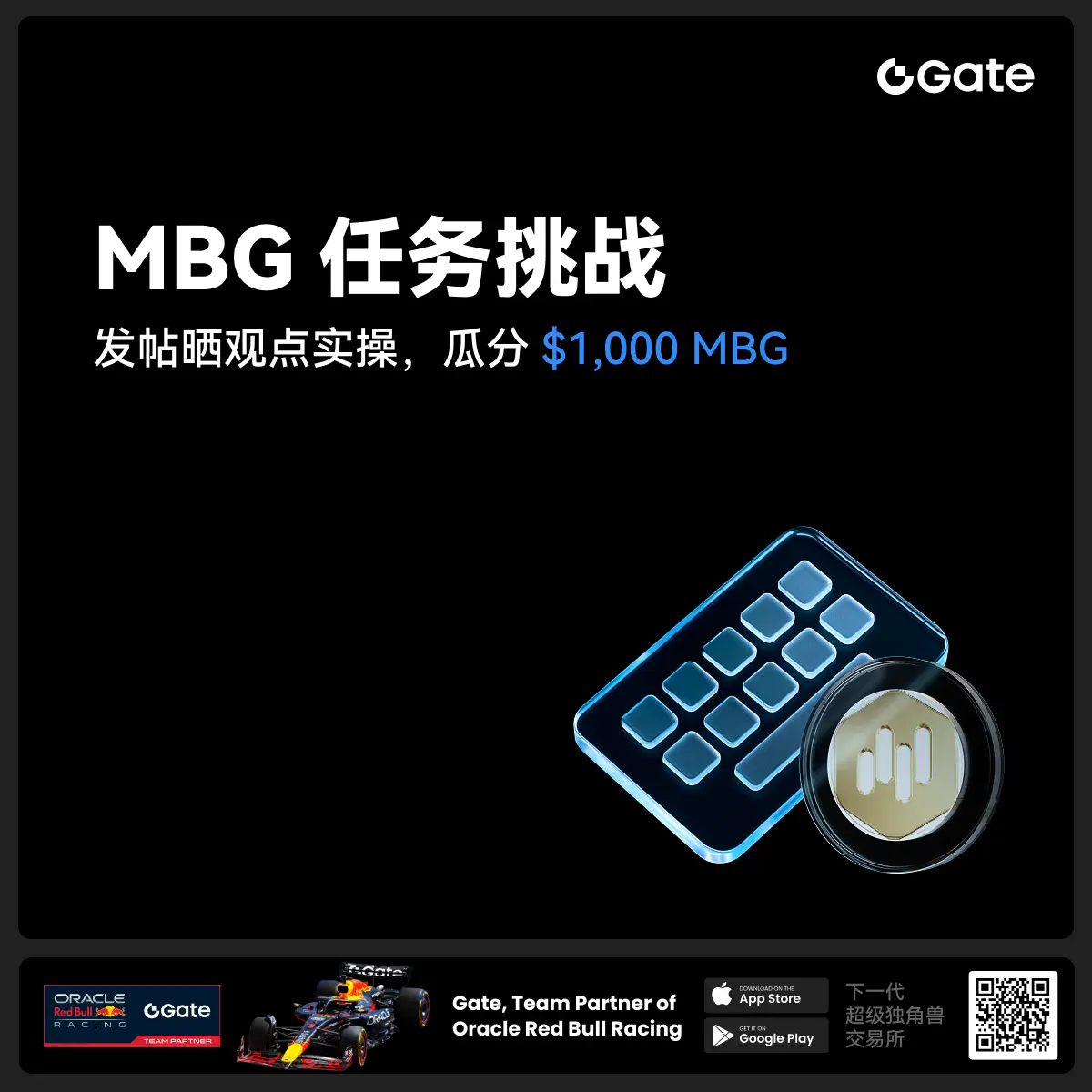- 話題1/3
27001 熱度
31806 熱度
27101 熱度
55063 熱度
19031 熱度
- 置頂
- 📢 Gate廣場 #MBG任务挑战# 發帖贏大獎活動火熱開啓!
想要瓜分1,000枚MBG?現在就來參與,展示你的洞察與實操,成爲MBG推廣達人!
💰️ 本期將評選出20位優質發帖用戶,每人可輕鬆獲得50枚MBG!
如何參與:
1️⃣ 調研MBG項目
對MBG的基本面、社區治理、發展目標、代幣經濟模型等方面進行研究,分享你對項目的深度研究。
2️⃣ 參與並分享真實體驗
參與MBG相關活動(包括CandyDrop、Launchpool或現貨交易),並曬出你的參與截圖、收益圖或實用教程。可以是收益展示、簡明易懂的新手攻略、小竅門,也可以是現貨行情點位分析,內容詳實優先。
3️⃣ 鼓勵帶新互動
如果你的帖子吸引到他人參與活動,或者有好友評論“已參與/已交易”,將大幅提升你的獲獎概率!
MBG熱門活動(帖文需附下列活動連結):
Gate第287期Launchpool:MBG — 質押ETH、MBG即可免費瓜分112,500 MBG,每小時領取獎勵!參與攻略見公告:https://www.gate.com/announcements/article/46230
Gate CandyDrop第55期:CandyDrop x MBG — 通過首次交易、交易MBG、邀請好友註冊交易即可分187,500 MBG!參與攻略見公告:https://www.gate.com/announcements
- 📢 #Gate广场征文活动第三期# 正式啓動!
🎮 本期聚焦:Yooldo Games (ESPORTS)
✍️ 分享獨特見解 + 參與互動推廣,若同步參與 Gate 第 286 期 Launchpool、CandyDrop 或 Alpha 活動,即可獲得任意獎勵資格!
💡 內容創作 + 空投參與 = 雙重加分,大獎候選人就是你!
💰總獎池:4,464 枚 $ESPORTS
🏆 一等獎(1名):964 枚
🥈 二等獎(5名):每人 400 枚
🥉 三等獎(10名):每人 150 枚
🚀 參與方式:
在 Gate廣場發布不少於 300 字的原創文章
添加標籤: #Gate广场征文活动第三期#
每篇文章需 ≥3 個互動(點讚 / 評論 / 轉發)
發布參與 Launchpool / CandyDrop / Alpha 任一活動的截圖,作爲獲獎資格憑證
同步轉發至 X(推特)可增加獲獎概率,標籤:#GateSquare 👉 https://www.gate.com/questionnaire/6907
🎯 雙倍獎勵機會:參與第 286 期 Launchpool!
質押 BTC 或 ESPORTS,瓜分 803,571 枚 $ESPORTS,每小時發放
時間:7 月 21 日 20:00 – 7 月 25 日 20:00(UTC+8)
🧠 寫作方向建議:
Yooldo
- 🎉Gate 2025 上半年社區盛典:內容達人評選投票火熱進行中 🎉
🏆 誰將成爲前十位 #Gate广场# 內容達人?
投票現已開啓,選出你的心頭好
🎁贏取 iPhone 16 Pro Max、限量週邊等好禮!
📅投票截止:8 月 15 日 10:00(UTC+8)
立即投票: https://www.gate.com/activities/community-vote
活動詳情: https://www.gate.com/announcements/article/45974
- 📢 #Gate广场征文活动第二期# 正式啓動!
分享你對 $ERA 項目的獨特觀點,推廣ERA上線活動, 700 $ERA 等你來贏!
💰 獎勵:
一等獎(1名): 100枚 $ERA
二等獎(5名): 每人 60 枚 $ERA
三等獎(10名): 每人 30 枚 $ERA
👉 參與方式:
1.在 Gate廣場發布你對 ERA 項目的獨到見解貼文
2.在貼文中添加標籤: #Gate广场征文活动第二期# ,貼文字數不低於300字
3.將你的文章或觀點同步到X,加上標籤:Gate Square 和 ERA
4.徵文內容涵蓋但不限於以下創作方向:
ERA 項目亮點:作爲區塊鏈基礎設施公司,ERA 擁有哪些核心優勢?
ERA 代幣經濟模型:如何保障代幣的長期價值及生態可持續發展?
參與並推廣 Gate x Caldera (ERA) 生態周活動。點擊查看活動詳情:https://www.gate.com/announcements/article/46169。
歡迎圍繞上述主題,或從其他獨特視角提出您的見解與建議。
⚠️ 活動要求:
原創內容,至少 300 字, 重復或抄襲內容將被淘汰。
不得使用 #Gate广场征文活动第二期# 和 #ERA# 以外的任何標籤。
每篇文章必須獲得 至少3個互動,否則無法獲得獎勵
鼓勵圖文並茂、深度分析,觀點獨到。
⏰ 活動時間:2025年7月20日 17
- 📢 ETH衝擊4800?我有話說!快來“Gate廣場”秀操作,0.1 ETH大獎等你拿!
牛市預言家,可能下一個就是你!想讓你的觀點成爲廣場熱搜、贏下ETH大獎?現在就是機會!
💰️ 廣場5位優質發帖用戶+X瀏覽量前5發帖用戶,瓜分0.1 ETH!
🎮 活動怎麼玩,0門檻瓜分ETH!
1.話題不服來辯!
帶 #ETH冲击4800# 和 #ETH# 在 廣場 或 K線ETH下 圍繞一下主題展開討論:
-ETH是否有望突破4800?
-你看好ETH的原因是什麼?
-你的ETH持倉策略是?
-ETH能否引領下一輪牛市?
2. X平台同步嗨
在X平台發帖討論,記得帶 #GateSquare# 和 #ETH冲击4800# 標籤!
把你X返連結提交以下表單以瓜分大獎:https://www.gate.com/questionnaire/6896
✨發帖要求:
-內容須原創,字數不少於100字,且帶活動指定標籤
-配圖、行情截圖、分析看法加分,圖文並茂更易精選
-禁止AI寫手和灌水刷屏,一旦發現取消獎勵資格
-觀點鮮明、邏輯清晰,越有料越好!
關注ETH風向,創造觀點價值,從廣場發帖開始!下一個牛市“預言家”,可能就是你!🦾🏆
⏰ 活動時間:2025年7月18日 16:00 - 2025年7月28日 23:59(UTC+8)
【立即發帖】 展現你的真知灼見,贏取屬於你的ETH大獎!
Could centralization be the silent killer of AI and cloud innovation?
Advancements in cloud computing, data storage and artificial intelligence have transformed how businesses operate and manage information. However, this transformation has also led to challenges because these technologies are highly centralized and in the hands of a few tech giants
The cloud computing industry is currently dominated by three key players: Amazon Web Services (AWS), Microsoft Azure and Google Cloud Platform. These companies control over 65% of the global cloud computing market. AWS holds the largest share at 31%, followed by Microsoft Azure at 25% and Google Cloud at 11%. This concentration of power raises several concerns for the broader technology ecosystem.
The impact of centralization on cloud computing and AI
The dominance of a few major companies reduces innovation in the space. For example, Dropbox previously used AWS infrastructure but was forced into a costly pivot as the business scaled. The additional costs and technical limitations imposed by AWS’s infrastructure pushed the company to invest heavily in building its own data centers, an option not available to smaller players who have difficulty raising capital
In some cases, reliance on a dominant cloud provider can also make companies susceptible to political pressures. Conservative social media platform Parler faced disruption in January 2021 when AWS suspended its services due to concerns over content moderation. This action effectively took Parler offline and showed how dependence on a major cloud provider could expose companies to risks beyond technical or operational challenges
Furthermore, dependence on centralized cloud providers has led to regulatory and compliance difficulties for organizations with data centers in regions with different legal standards. The European General Data Protection Regulation enforces rigorous data protection standards, which often clash with the more lenient regulations of other regions. A 2020 McAfee survey found that 52% of companies encountered compliance challenges due to the geographical location of their cloud data centers
Exploring decentralized alternatives
In light of these challenges, decentralized cloud computing solutions have emerged as potential alternatives to the centralized models currently dominating the industry. They aim to distribute control and ownership of cloud infrastructure more broadly and reduce the risks associated with centralization.
One such alternative is Store, a decentralized cloud storage and computing network that seeks to democratize high-performance cloud infrastructure. Store’s infrastructure spans multiple data centers.
It features up to 26,400 virtual central processing units, 240 terabytes of memory and 12,000 TB of HDD storage. Store’s storage options include both SSD storage for high-speed data access and HDD storage, which is more cost-efficient and suitable for backups. Additionally, Store offers permanent storage as a programmable cloud space primitive and web service.
Store’s infrastructure is designed to scale horizontally, which means it can expand by adding more machines or servers to handle increased demand, keeping the system flexible and efficient as it grows.
The network’s incentives revolve around the STORE token, a utility token that grants access to trust-minimized computing resources on the Store protocol. Initially launching as an ERC-20 token, STORE will eventually transition to its own blockchain.
The total authorized supply of STORE is 1 billion, with 704,712,370 already allocated. The remaining unallocated supply will be used for miscellaneous purposes as outlined in Store’s long-term treasury schedule
Unallocated tokens are expected to fund network security, ecosystem growth, long-term development, and governance initiatives. Besides funding the ecosystem, STORE serves multiple functions, including staking, voting and payments on the Store Cloud
On the technical front, STORE utilizes a patented consensus algorithm called BlockfinBFT, designed to achieve high transaction throughput. The protocol also features an AI oracle leveraging over 350 application programming interfaces to provide protocol intelligence and optimize for monetary soundness.
Looking ahead, it’s clear that the future of cloud computing will benefit from embracing decentralization. This approach can help address the limitations of centralized systems, promote innovation, and create a more equitable digital landscape. As the industry evolves, learning from past challenges and adopting decentralized solutions will be key to building a cloud infrastructure that supports a wide range of needs.
This article does not contain investment advice or recommendations. Every investment and trading move involves risk, and readers should conduct their own research when making a decision.
This article is for general information purposes and is not intended to be and should not be taken as legal or investment advice. The views, thoughts, and opinions expressed here are the author’s alone and do not necessarily reflect or represent the views and opinions of Cointelegraph.
Cointelegraph does not endorse the content of this article nor any product mentioned herein. Readers should do their own research before taking any action related to any product or company mentioned and carry full responsibility for their decisions.